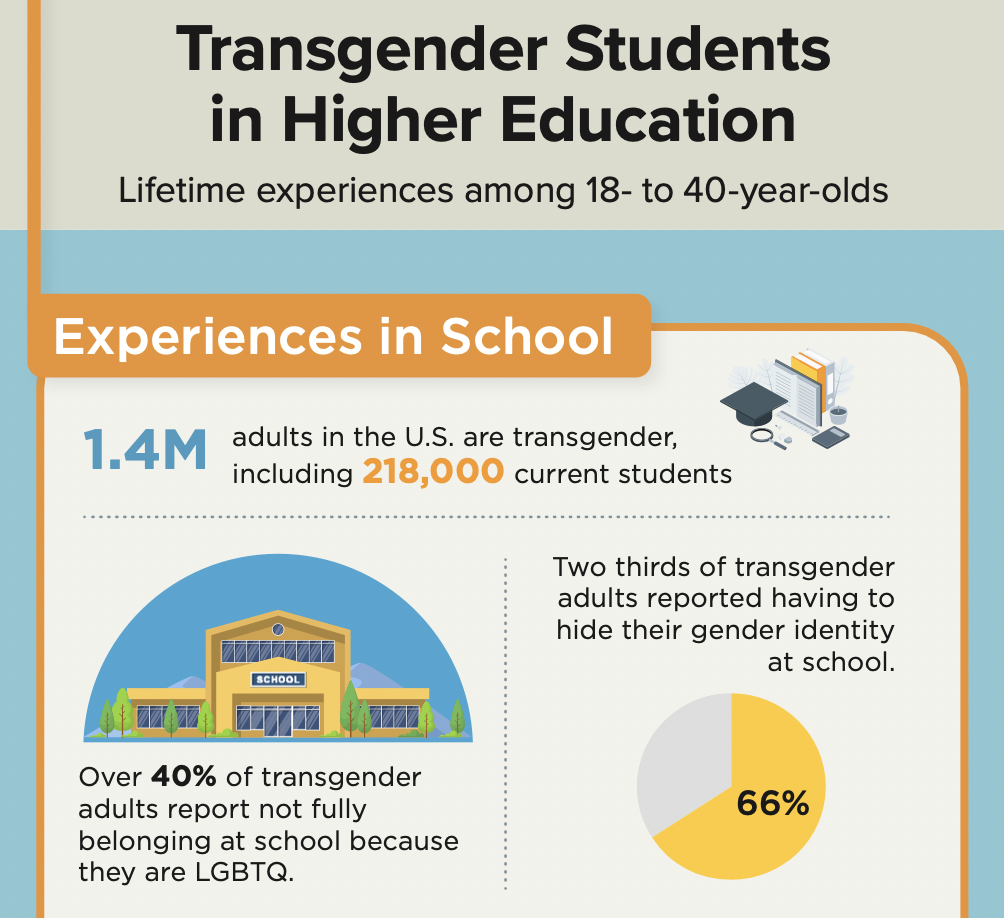Research Reports
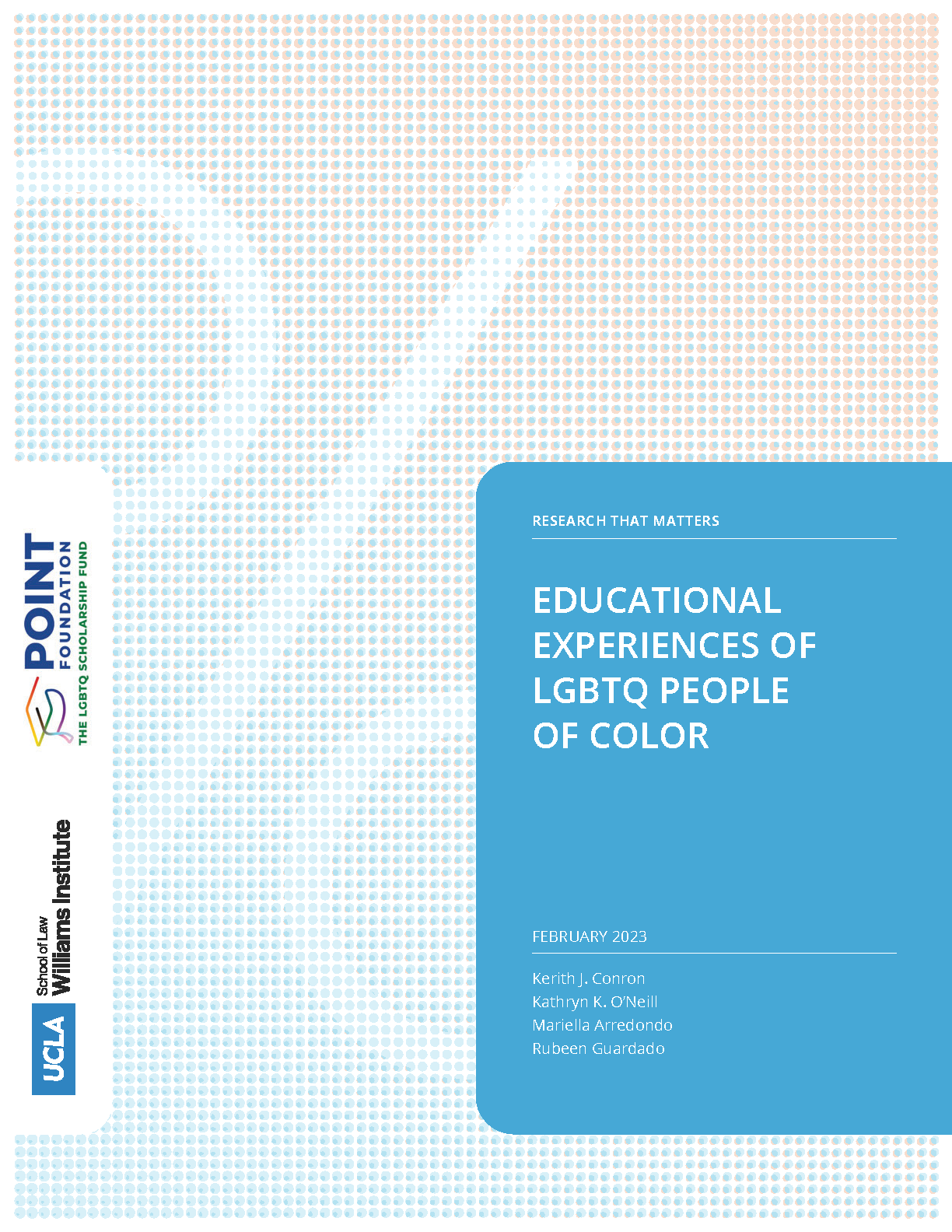
Educational Experiences of LGBTQ+ People of Color
A new study from the Williams Institute at UCLA School of Law, in collaboration with the Point Foundation finds more than twice as many LGBTQ+ people of color as white LGBTQ+ adults report that unfair treatment at school due to being LGBTQ+ was a challenge to their academic success (10% vs. 4%). Lifetime anti-LGBTQ+ bullying, harassment, and unfair treatment also kept them from getting the amount of education, training, or degrees that they wanted (15% vs. 7%).
Read the full report below.

Educational Experiences of LGBTQ+ People of Color
A new study from the Williams Institute at UCLA School of Law, in collaboration with the Point Foundation finds more than twice as many LGBTQ+ people of color as white LGBTQ+ adults report that unfair treatment at school due to being LGBTQ+ was a challenge to their academic success (10% vs. 4%). Lifetime anti-LGBTQ+ bullying, harassment, and unfair treatment also kept them from getting the amount of education, training, or degrees that they wanted (15% vs. 7%).
Read the full report below.
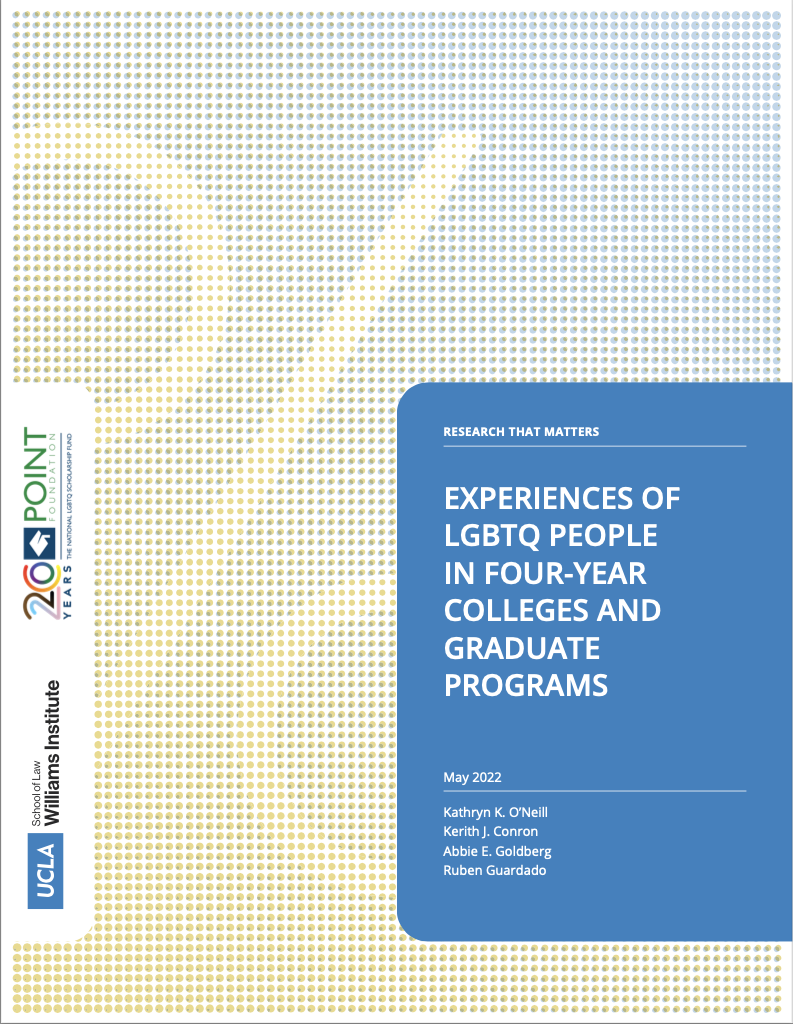
Experiences of LGBTQ+ People in Four-Year Colleges and Graduate Programs
A new study from the Williams Institute at UCLA School of Law conducted in collaboration with the Point Foundation, finds LGBTQ+ people were four times more likely than non-LGBTQ+ people to report having picked a college in a different city or state in search of a more welcoming climate (22% vs. 5%, respectively).
Twice as many LGBTQ+ people (33%) as non-LGBTQ+ people (14%) chose to attend a college elsewhere to get away from their families. While in school, LGBTQ+ students were more likely than their non-LGBTQ+ peers to experience poor mental health, bullying, and harassment.
Download our infographic here and read the full report.

Experiences of LGBTQ+ People in Four-Year Colleges and Graduate Programs
A new study from the Williams Institute at UCLA School of Law conducted in collaboration with the Point Foundation, finds LGBTQ+ people were four times more likely than non-LGBTQ+ people to report having picked a college in a different city or state in search of a more welcoming climate (22% vs. 5%, respectively).
Twice as many LGBTQ+ people (33%) as non-LGBTQ+ people (14%) chose to attend a college elsewhere to get away from their families. While in school, LGBTQ+ students were more likely than their non-LGBTQ+ peers to experience poor mental health, bullying, and harassment.
Download our infographic here and read the full report.
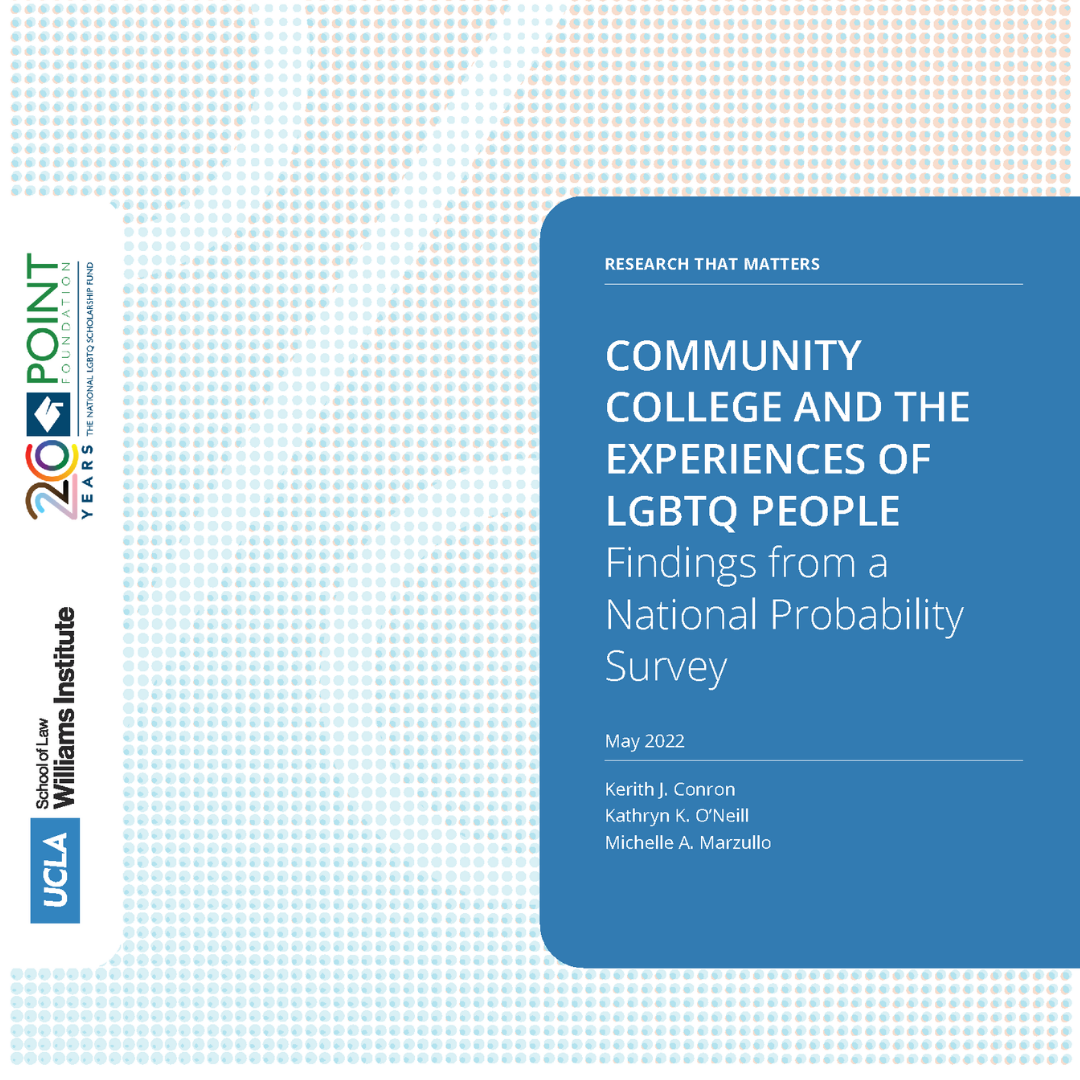
Community College and the Experiences of LGBTQ+ People
This study from the Williams Institute at UCLA School of Law conducted in collaboration with Point Foundation, finds that most LGBTQ+ people who attended community college were not “out” while attending, and LGBTQ+ students were more likely than non-LGBTQ+ students to report discrimination, harassment, and mental health struggles during their time there.
A majority (74.8%) of LGBTQ+ people reported not being “out” as being LGBTQ+ to any of their teachers or staff, and 56.2% of LGBTQ+ people were not “out” to any other students at their community college. About four out of ten of all people found faculty and school staff and students at their community college to be “very accepting” of LGBTQ+ people.
Click below to read the full report.

Community College and the Experiences of LGBTQ+ People
This study from the Williams Institute at UCLA School of Law conducted in collaboration with Point Foundation, finds that most LGBTQ+ people who attended community college were not “out” while attending, and LGBTQ+ students were more likely than non-LGBTQ+ students to report discrimination, harassment, and mental health struggles during their time there.
A majority (74.8%) of LGBTQ+ people reported not being “out” as being LGBTQ+ to any of their teachers or staff, and 56.2% of LGBTQ+ people were not “out” to any other students at their community college. About four out of ten of all people found faculty and school staff and students at their community college to be “very accepting” of LGBTQ+ people.
Click below to read the full report.
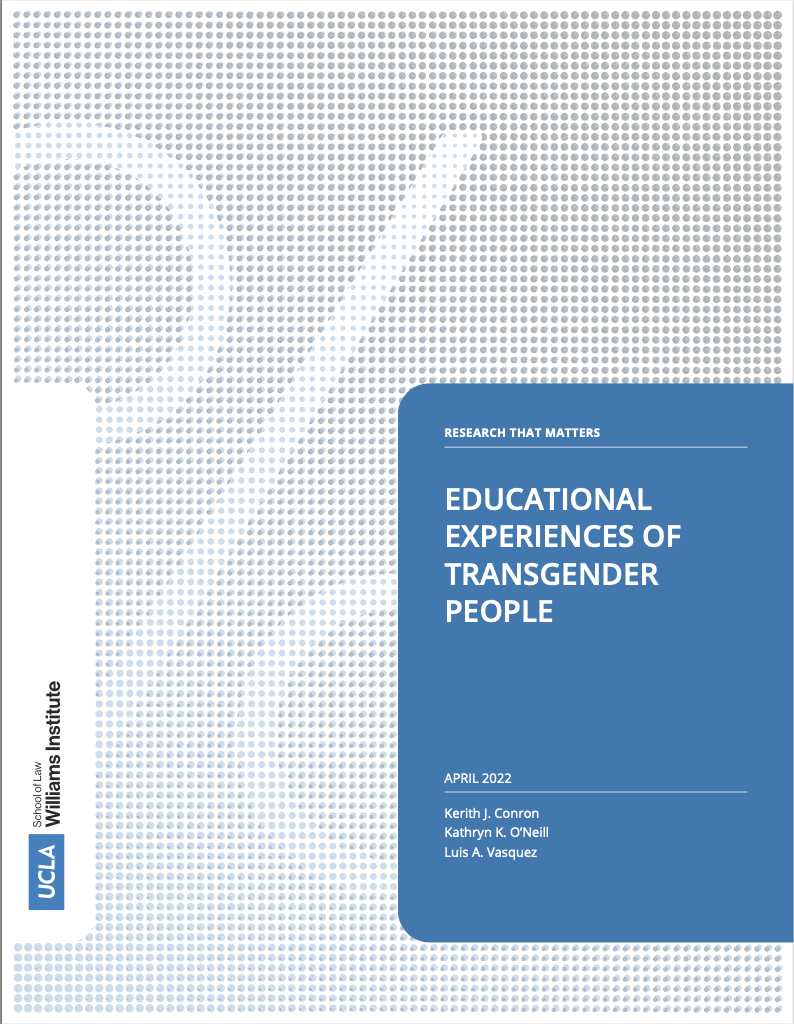
Transgender Students in Higher Education
This study from the Williams Institute at UCLA School of Law conducted in collaboration with Point Foundation, finds that more than half (55%) of transgender students say that their mental health was not good all or most of the time while they were in higher education programs. More than a third (39%) of transgender people experienced bullying, harassment, or assault while they were there. And nearly a third (32%) of transgender people reported unfair treatment by teachers, staff, or school administrators.
To see the full report, click below.

Transgender Students in Higher Education
This study from the Williams Institute at UCLA School of Law conducted in collaboration with Point Foundation, finds that more than half (55%) of transgender students say that their mental health was not good all or most of the time while they were in higher education programs. More than a third (39%) of transgender people experienced bullying, harassment, or assault while they were there. And nearly a third (32%) of transgender people reported unfair treatment by teachers, staff, or school administrators.
To see the full report, click below.
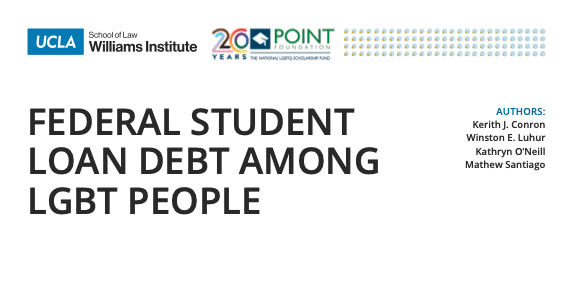
Federal Student Loan Debt Among LGBT People
An estimated 42.9 million Americans, particularly younger adults, have student debt. On average they owe $32,731, with variability by race/ethnicity and gender. Black college graduates owe $25,000 more than their White counterparts; women hold about two-thirds of all student debt.
Concern about the burden of student debt has been heightened by the COVID-19 pandemic. In response to college closures and economic turbulence generated by the pandemic, policymakers suspended federal student loan payments and set the interest rate on federal student loans at 0%.
Download the report by clicking below.

Federal Student Loan Debt Among LGBT People
An estimated 42.9 million Americans, particularly younger adults, have student debt. On average they owe $32,731, with variability by race/ethnicity and gender. Black college graduates owe $25,000 more than their White counterparts; women hold about two-thirds of all student debt.
Concern about the burden of student debt has been heightened by the COVID-19 pandemic. In response to college closures and economic turbulence generated by the pandemic, policymakers suspended federal student loan payments and set the interest rate on federal student loans at 0%.
Download the report by clicking below.
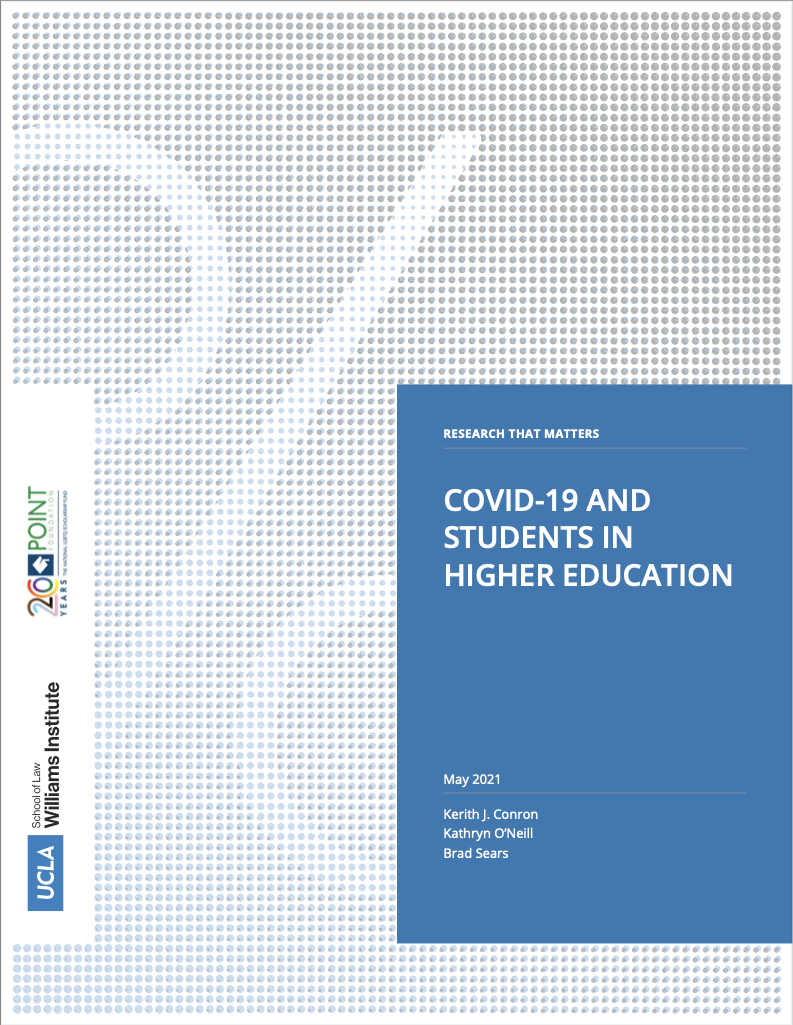
COVID-19 and Students in Higher Education
A new study from the Williams Institute at UCLA School of Law conducted in collaboration with the Point Foundation finds that the COVID-19 pandemic has impacted the educational opportunities, financial security, and housing stability of many college students in the U.S., including an estimated 3.4 million LGBTQ+ students ages 18-40.
To download the report, click below.

COVID-19 and Students in Higher Education
A new study from the Williams Institute at UCLA School of Law conducted in collaboration with the Point Foundation finds that the COVID-19 pandemic has impacted the educational opportunities, financial security, and housing stability of many college students in the U.S., including an estimated 3.4 million LGBTQ+ students ages 18-40.
To download the report, click below.
